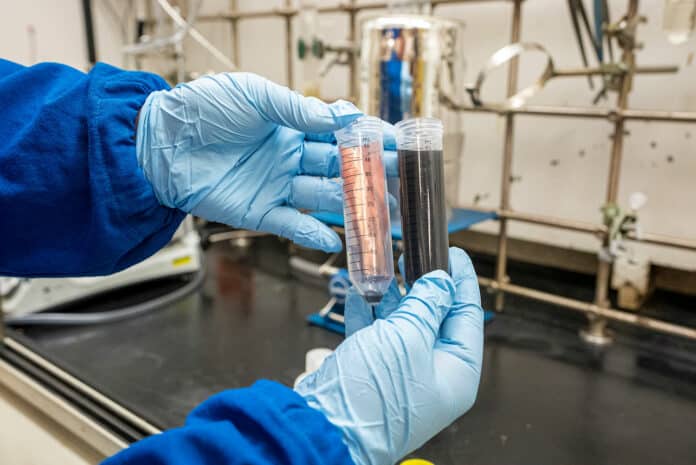Lithium-ion rechargeable batteries are already widely being used in electronic devices and electric vehicles, enabling an accelerating shift towards clean energy. But they come with environmental and human costs, which must be mitigated.
Materials in batteries, such as lithium, nickel, cobalt metals, and graphite, are increasingly scarce and expensive. Mining these materials requires a lot of energy and water. And as the demand is only accelerating, we are rapidly running out of the ingredients for Li-ion batteries, but demand is only accelerating. We need to reuse valuable components, but recycling batteries is difficult.
Researchers from Lawrence Berkeley National Laboratory (Berkeley Lab) have invented a material that solves these issues, making the process of extracting the ingredients for reuse easy, economical, cleaner, and more sustainable.
The new battery material is called the Quick-Release Binder. It’s a totally new type of binder – the glue-like substance that holds a battery’s active ingredients together.
The new Quick-Release Binder is made from two inexpensive, commercially available polymers, polyacrylic acid (PAA) and polyethyleneimine (PEI). These polymers are joined together through a bond between positively charged nitrogen atoms in PEI and negatively charged oxygen atoms in PAA. The binder dissolves in room-temperature alkaline water containing sodium hydroxide.
Batteries made with the binder simply need to be opened, placed in alkaline water, and gently shaken. The sodium ion breaks the two polymers apart, which dissolve into the liquid and free any electrode components embedded within. The separated elements can be easily filtered out of the water and air-dried.
Comparatively, current Li-ion battery recycling is an energy-demanding process that produces waste products. The method involves first shredding and grinding batteries, then burning them to separate the metals from the other constituents. The updated method is easier, cheaper, and better for the planet.
Excitingly, the Quick-Release Binder contains no toxic chemicals, and the unique production and breakdown processes eliminate the need for harsh solvents.
The research team is now working with Steve Sloop, a battery recycling developer and founder of OnTo Technologies, to finish testing the product and bring it to the market. They also hope to license the Quick-Release technology so it can be used in all the major Li-ion brands.
“The binder has a great feature that it can be ‘un-zipped’ with low-cost, environmentally benign processing, which benefits us all by improving the economic and environmental sustainability of advanced battery systems,” said Sloop. “It’s also a great achievement that the batteries contain no perfluoroalkyl and poly-fluoroalkyl substances (PFAS) – the family of compounds used to make non-stick coating and many other products, but it’s extraordinarily important for the future. Customers don’t want them due to the emerging link with health issues, and I think soon regulators will agree that we can’t keep using these chemicals.”
